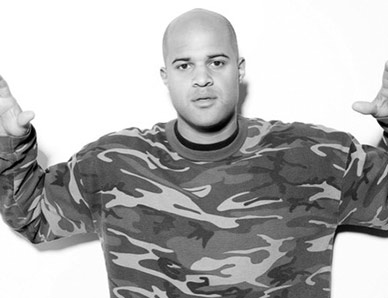Homebody Sandman is battling hip-hop's demons
 CREDIT: HOMEBOY SANDMAN
CREDIT: HOMEBOY SANDMANNew York rapper Homeboy Sandman.
VICTORIA (CUP) - Queens, New York rapper Homeboy Sandman's latest record, First of a Living Breed, is another important record in what's quickly becoming a career filled with important releases. Sandman's skill at turning a phrase extends beyond his lyrics, however; he writes eloquently about hip-hop as a genre.
"Where once the hip-hop landscape was rich with the type of diversity believed to have nowhere near the demand that negativity does, today it is completely saturated with the base immorality consumers are said to clamuor for," wrote Sandman for the Huffington Post in late 2012. "If negativity is what sells, one would expect hiphop sales to be at an all-time high."
There's a thread of positivity and forward thinking that runs through the entire album - something that's becoming increasingly rare in hip-hop. It may sound clich�d, but the inspiration for the record came from an oft-cited source: children.
"My nephew just turned four the other day. My niece is five. And, like, they're little human beings, and watching them definitely inspired First of a Living Breed and gave me the idea there's going to be a new breed coming that's going to fix things," said Sandman.
Songs like the bouncy "For the Kids" and the startling, dark rap "Illuminati" further establish Sandman's credentials as an intellectual force in the hip-hop game. After abandoning a Paul Whiteproduced track that couldn't make the record due to problems getting the sample cleared, Sandman chose to include "Illuminati" to fill what he says was "a gap in the record from the standpoint of social commentary." He adds, "I was really happy that I had (that track) to plug that hole."
First of a Living Breed is an album sprawling with ideas both musical and lyrical — a perfect continuation of a career that has been defined by defying expected norms within not just the hip-hop community, but also in the music community as a whole.
"It's like a social experiment," said Sandman. "With music these days, music isn't really what it used to be, to be honest. I mean, there's good music being made, but the music that is popularized is not popularized for the same reasons it used to be."
Uniformity is something Sandman rails against in his music.
"When you look at real artistry, you're going to see variation," he said. "Because real artists believe in the reflection of real life and real people. You see a lot of uniformity in hip-hop and music now, but I don't think that's a real reflection. But people have gotten used to hearing the same thing from people all the time."
Unfortunately, the sameness that runs through modern hip-hop music is one laced with poison - misogyny, violence and disrespect. But that's not the Sandman's game.
"I'm not disrespectful. I really think that's corny, to be honest. There's a lot of insecurity in hiphop, a lot of me versus myself, me versus women, me versus woman, people that look this way versus people that look like me. I've never really gotten down with that. I try to keep it people based. I try to do this the best I can."
Sandman is one of the strongest opponents of the misogyny that runs rampant through the genre. Songs like "Couple Bars" and "Listen" (from First of a Living Breed and The Good Sun, respectively) are honest, thoughtful songs about the highs and lows of malefemale relationships, never veering into the disrespectful language that seems often to plague even the most conscious of MCs.
"Some guys are like, 'Women are terrible.' Women aren't terrible; terrible women are terrible. Terrible men are terrible. Terrible people are terrible. It's shameful to see the misogyny that goes on in hip-hop," said Sandman. "Seems to me like the amount of respect people show for others is a good indicator of the respect they have for themselves."
Shining an informing light through music and rapping with a social commentary bent is a delicate balancing act that Sandman is all too aware of.
"I feel like what makes it effective to me is being able to say things that people might not think about all the time. Stuff they really want to hear. The fact that they're getting kind of bamboozled in a sense makes people uncomfortable. So (the music) needs to be super fresh." And super fresh is just how Homeboy Sandman rocks it.
Always shifting sounds and creating new ways to attack the music and spread the light, Sandman is at the precipice of a promising time not only in hip-hop, but also in all art and community. A beginning that a whole new generation is a part of - one of wakefulness, thoughtfulness and togetherness.
"We're all coming from the same breed," said Sandman. "It ain't just music, but it's journalism, activism ... that's that breed."













